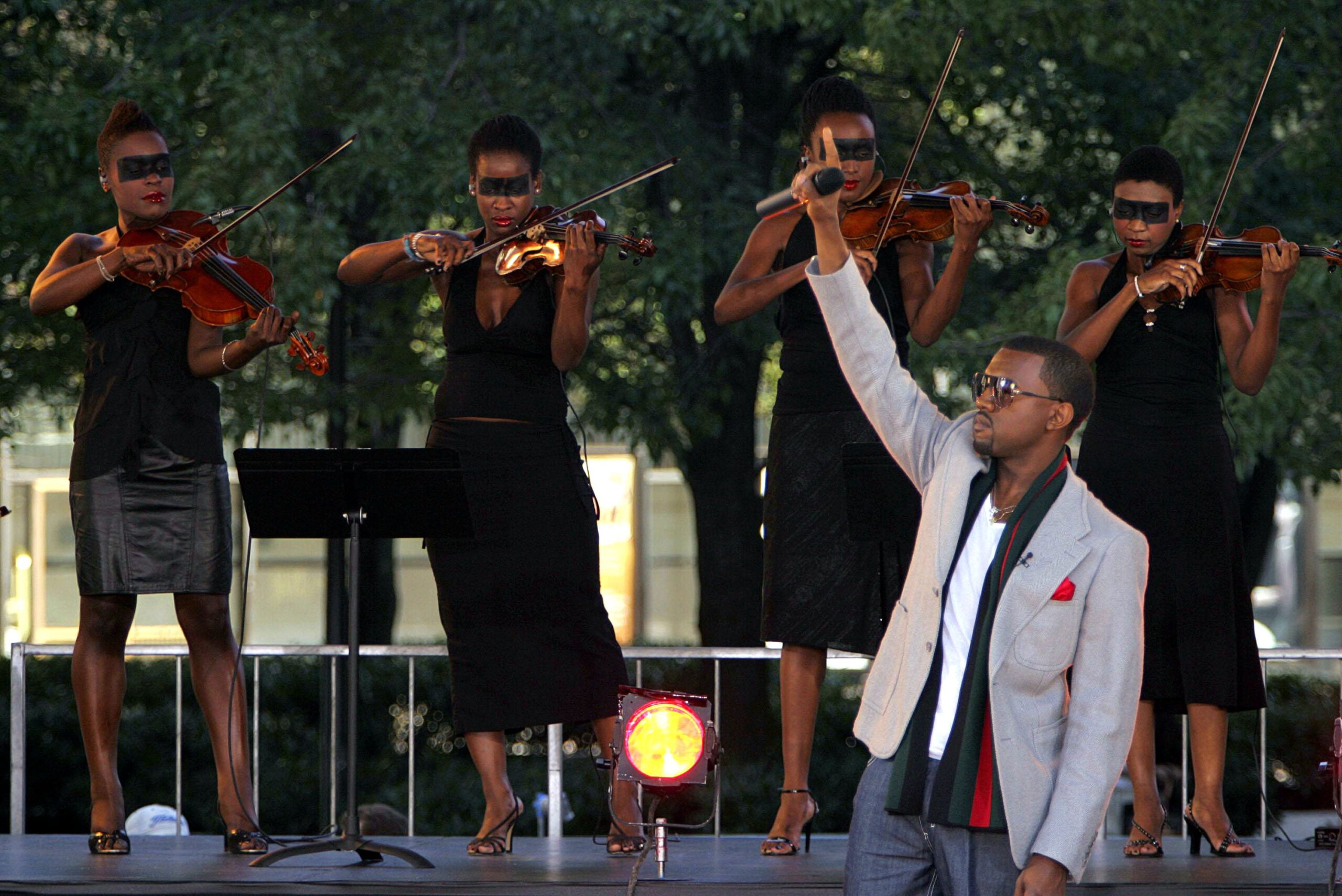Music
The Myth of the Mad Genius: Kanye West Says “Crazy Music” Comes from a “Crazy Person”
29 May, 19

Kanye West on stage
Photo by Everett Collection (Shutterstock)
Kanye West believes that crazy art comes from crazy people.
His view stems from his experiences with bipolar disorder, which he details in his interview for season 2 of My Next Guest Needs No Introduction with David Letterman, released May 31. The 41-year-old rapper described “the potential to ramp up” when off medication and how he’s experienced bipolar episodes over the two years since he was diagnosed. “If you don’t take medication every day to keep you at a certain state, you have a potential to ramp up and it can take you to a point where you can even end up in the hospital,” West tells Letterman. “And you start acting erratic, as TMZ would put it.”
My Next Guest Needs No Introduction with David Letterman | Season 2 Trailer | Netflixyoutu.be
Kanye spoke with his signature conviction and non-sequiturs, telling Letterman: “There’s no dumb easy way to explain, it’s just something that you know we’re going to have to take time to understand,” West continues. “There’s things where you would’ve just locked your—you know, a hundred years ago they may have locked your uncle in the room…”
His core point is to criticize how the mentally ill are treated when they’re experiencing an episode. He said, “I’m starting to research these things because the experience of when you go through an episode if you actually go to the hospital, there’s a moment that I have to talk about publicly that has to be changed. So, I’m gonna talk about this publicly so this moment can change. So, when you’re in this state, you’re hyper-paranoid about everything. Everyone.”
He qualified “This is my experience. Some people have other experiences. Everyone now is an actor. Everything is a conspiracy. You see everything. You feel the government is putting chips in your head. You feel you’re being recorded. You feel all of these things.”
Ultimately, he criticized that an individual experiencing a bipolar episode may find hospitalization traumatizing. West describes the rough protocol of institutionalization: “And you get taken, and you have this moment. You feel everyone wants to kill you. You pretty much don’t trust anyone, and they have this moment where they put you, they handcuff you, they drug you, they put you on the bed, and they separate you from everyone you know. They don’t do that to pregnant women. That’s something that I am so happy that I experienced myself so I can start by changing that moment…when you are in that state, you have to have someone you trust. It is cruel and primitive to do that.”
It’s true that hospitalization has long posed the risk of traumatizing patients experiencing emotional or mental disturbances. But West bookends this very valid criticism with a trademark, problematic spin: “You know, if you guys want these crazy ideas and these crazy stages, this crazy music and this crazy way of thinking, there’s a chance it might come from a crazy person.”
Unfortunately, the stereotype that “crazy” artists produce high-quality art is a deep-seated cultural belief about “genius.” Namely, the collective myth that “genius” is a type of creative insanity (or insane creativity) warps our perceptions of art. And West has made it abundantly clear that he views himself as a genius, as he’s attributed much of his “erratic” behavior to his creative gifts. On his 2016 album The Life of Pablo, he raps in “Feedback,” “Name one genius who ain’t crazy.” Back in 2007’s Graduation, he rapped on “Barry Bonds,” “I’m doing pretty good as far as geniuses go.”
In fact, the myth of the “mad genius” is perpetuated by confirmation bias. In 2014, two bored psychologists designed a study to measure the public’s false association between art and mental illness. Dubbing this the “eccentricity effect,” they “tested the hypothesis that eccentricity increases perceptions of artistic quality…based on the notion that artists are typically perceived as eccentric, creative, and skilled.” In three stages, subjects were shown Van Gogh paintings, a photograph of a costumed Lady Gaga, and paintings of a fictitious artist that they presented as real. In short, they found that people who were told beforehand about the artist’s “eccentric” personality perceived the artist to be more talented than those who were not given any prior information. Published as “From Van Gogh to Lady Gaga: Artist Eccentricity Increases Perceived Artistic Skill and Art Appreciation,” the study found that viewers’ perceptions of an artist being “eccentric” positively impacted their perceptions of their art.
So, whereas two UK psychologists used the scientific method to conclude that people’s perceptions of art “depend crucially on the perceived degree of eccentricity of the artist,” Kanye West simply said, “[T]his crazy music and this crazy way of thinking, there’s a chance it might come from a crazy person.”
But this false association between “genius” and art is still a plague on today’s culture. Last year, Pitchfork‘s Jason Greene argued about “Kanye West and Why the Myth of ‘Genius’ Must Die,” writing, “The larger cultural insanity of genius twists all of us.” He explains, “Watching Kanye hurl himself into the gears of social media this month, I found myself fervently wishing for the death of genius and the birth of something more adult and humane. What is ‘genius,’ after all, if not societally celebrated madness?”
The issue is not at all criticism of West’s own mental health; rather, West propagates the fallacy that great artists derive inspiration from mental instability more than individual talent or creativity. In reality, as Greene writes, “‘Genius’ might just be a permission slip you write yourself to knock things down at will, and likely ‘genius’ has done as much to raise our cultural landscape to the ground as it has to build it.” In romanticizing mental illness, the “mad genius” trope devalues not only the artist but the society that glamorizes instability as an artistic performance.
- “The Life of Pablo” Was the Beginning of the End of Kanye West – Popdust ›
- Kanye West’s Billion-Dollar Fortune Came at Other’s Expense – Popdust ›
- “The Life of Pablo” Was the Beginning of the End of Kanye West – Popdust ›
- Twitter’s #HowIFightDepression Offers Tips for Depression – Popdust ›
- Everything Kanye Discusses on Letterman’s Netflix Show: Drake … ›
- 7 Things We Learned From Kanye West’s David Letterman Interview … ›
- Kanye West Fires Back at David Letterman: Liberals ‘Bully’ Trump … ›
- David Letterman Reportedly Interviewed Kanye West for His Netflix … ›
- Kanye West styles David Letterman in head-to-toe Yeezy ›
- Kanye West is not exactly the ‘old Kanye’ in his David Letterman … ›
- Kanye West Talks #MeToo, Trump With David Letterman – Rolling … ›
- David Letterman Interviewed Kanye West for His Netflix Talk Show ›
- Kanye West opens up about managing his mental health in David … ›













